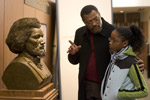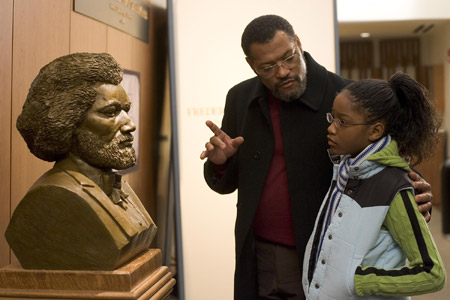Akeelah and the Bee
 Akeelah Henderson (Keke Palmer) seems like a typical girl on the surface. She talks about boys with her friend, Georgia (Sahara Garey), at Crenshaw Middle School. But underneath her loquaciousness lies an insecure prodigy. She hides her perfect test scores from her peers, fearing ostracism for her intelligence. Her oldest brother is in the military, and…
Akeelah Henderson (Keke Palmer) seems like a typical girl on the surface. She talks about boys with her friend, Georgia (Sahara Garey), at Crenshaw Middle School. But underneath her loquaciousness lies an insecure prodigy. She hides her perfect test scores from her peers, fearing ostracism for her intelligence. Her oldest brother is in the military, and…

Akeelah Henderson (Keke Palmer) seems like a typical girl on the surface. She talks about boys with her friend, Georgia (Sahara Garey), at Crenshaw Middle School. But underneath her loquaciousness lies an insecure prodigy.
She hides her perfect test scores from her peers, fearing ostracism for her intelligence. Her oldest brother is in the military, and a good role model. The younger picks on her when he’s home, which isn’t often. A gangbanger, he serves as the family antithesis to Akeelah’s potential.
Her school is well aware of the doors that are open to her, even if she isn’t. School Principal Welch (Curtis Armstrong) has been approached by Dr. Joshua Larabee (Laurence Fishburne) from UCLA, who is scouting inner city students to coach for participation in the Scripps Howard National Spelling competition.
Dr. Larabee is the decidedly eccentric professor with the acerbic wit. He tends to his plants methodically and quietly. Similarly, he has a profound, at times stifling, respect for “proper” manners, habits and communication. Akeelah responds unkindly to his temperament, but appeals to his linguistic legerdemain when she declares, “I don’t need help from a dictatorial, truculent, supercilious gardener.” Though offended, Larrabee appears to intuit somewhere in the back of his mind that she may actually have a point.
While I admire the film for bucking the Hollywood tendency to wheel out only basketball players and rappers as role models for African-Americans, and providing us with insight into the world of a gawky child genius who has not only the capacity to memorize words but understand and absorb the fundamental structure of language itself, the movie’s framework is still rather formulaic. Unlike such movies, this one revisits the inspiring words and wisdom of prominent African-Americans such as Frederick Douglass and W.E.B. Du Bois.
The father is absent (passed away), and the mother works all hours as a nurse and has a crass attitude toward her daughter’s extraordinary talents. Instead of championing the daughter at first, artificial tension is created by having the mother oppose the initial coaching by Dr. Larabee only to have a complete reversal of attitude after one brief “squandering her full potential” speech by him.
Then you have the primary competition, Dylan Chu (Sean Michael). Not only is he the incredibly bright yet tactless Asian-American child, but his father is a stereotype of the crack-whipping persuasion to sadistically absurd proportions. While it’s quite true that many Asian families put a very high value on education as a path to living a secure and accomplished life, here the brief glimpses of Dylan’s father haranguing him over small mistakes are played purely for shock and mock sympathy. We’re not required to learn anything further about Dylan, his family dynamic or whatever his real dreams are.
The film works when it is uncomplicated in showing us Akeelah the kid at play or Akeelah the mnemonic database, competing at local, state and national levels. Larrabee knows she has a natural aptitude that goes well beyond his ability to coach, and he nearly gives in to that. But, of course, as with every film that follows a staid formula, this one’s mentor is practically required to have his cathartic revelation and finally throw himself back in the ring. Akeelah is his redeemer, and the director drives this home in a hero shot complete with golden backlighting crowning Larabee’s bespectacled, little savior.
There are genuinely fun moments with Akeelah and Javier (J.R. Villarreal), a student from Dylan’s upscale school. Javier is a charming, comical extrovert—one of those kids whose exuberance seems to suggest “stand-up comic” in his future, and perhaps a budding romance between the two.
The film does take an interesting turn at the National Championships. I won’t tell you exactly. However, sometimes a film is about winning or it’s about losing gracefully. This film actually avoids either, but manages to have a definite conclusion leaving you with the satisfaction
All in all, “Akeelah and the Bee” is watchable, and enjoyable on some levels. It had the potential, however, to be great had it avoided running lockstep with the structure of lesser films.
 Akeelah and the Bee • Dolby® Digital surround sound in select theatres • Aspect ratio: 2.35:1 • Running Time: 112 minutes • MPAA Rating: PG for some language. • Distributed by Lions Gate Films
Akeelah and the Bee • Dolby® Digital surround sound in select theatres • Aspect ratio: 2.35:1 • Running Time: 112 minutes • MPAA Rating: PG for some language. • Distributed by Lions Gate Films